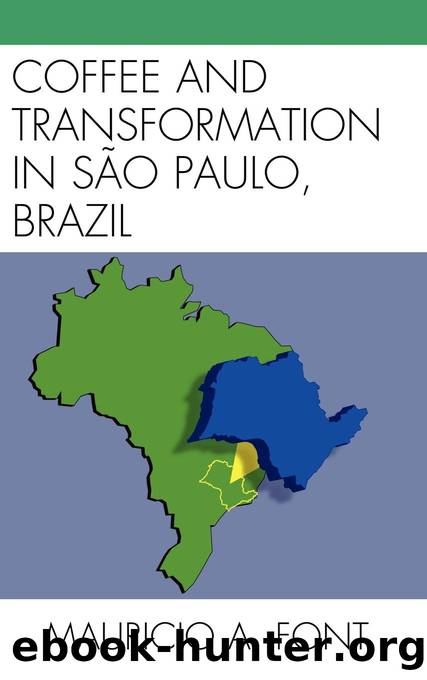Coffee and Transformation in Sao Paulo, Brazil by Font Mauricio A.;

Author:Font, Mauricio A.;
Language: eng
Format: epub
Publisher: Lexington Books
Published: 2010-08-15T00:00:00+00:00
Claims and Issues of the Partido Democrático
To shed further light on the major interests advanced by the Partido Democrático, this chapter next scrutinizes its founding manifesto of January 1926, published speeches and documents in the partyâs organizing drive throughout 1926, the first party congress in December 1926, and the electoral campaigns for federal congressional elections in February 1927. A cursory overview suffices to establish the high degree of correspondence between demands expressed thereby and those articulated by Big Coffee in associational and mobilizational activities.
The restoration of power to traditional Paulista elites and the overthrow of the âoligarchyâ was central. The partyâs campaigns emphasized such issues previously articulated by Big Coffee elites as municipal rights, the overthrow of the âusurping oligarchy,â and related electoral and regime reforms. Practically all major speeches by PD candidates played upon one or more of these themes, continuously hammering a critique of republican institutions. They charged that politics had become an âindustryâ (i.e., a remunerated and remunerative professional activity) in which politicians perpetuated themselves in power by extralegal means and denounced the despotism of the executive branch and administrative irresponsibility.81 These campaigns restated the theme of the partyâs manifesto: the right of âplanters, commerce and industryâ to influence government policies. On the other hand, they were in favor of better salaries for judges, and wanted a reform of the educational system. The attacks against the PRP were vehement. In the closing keynote speech of the first Congresso do Partido Democrático, LuÃs Aranha blamed the âtyrannyâ of the PRP for the problems of Paulista society and called for âdeath to the oligarchy.â In an inspired finale, the orator quoted Lamartine in terms which left no doubt about their intentions with the PRP: âLetâs kill the oligarchy and bury her very deeply . . . recalling the verse, Le bonheur de la mort est dâêtre enseveli.â
Another major issue in the PDâs oratory was protection of the coffee economy. The Partido Democrático was highly critical of the way the government handled the Coffee Institute and the latter operated. The party constantly demanded that the Institute be given to planters and that it adopt more pro-planter policies.82 No issues were more prevalent in the Democratsâ speeches than coffee protection. Paulo de Morais Barros led the pronouncements in this regard at the national congress, calling for coffee defense even if loans or money issuance would be required to give credit to planters. A decisive indication of the close relationship between the nascent Partido Democrático and the traditional coffee elites is the associational turmoil taking place in 1926, at the same time as the party was articulating its challenge to the government. All of the major coffee elitesâ associations had internal crises that year. Recalcitrant members associated with Paulo de Morais Barros, the Prados, Antônio de Queiroz Tellesâall members of the Partido Democráticoâattempted to gain control over the associations to pressure the state government. The PDâs candidate Luús de Queiroz Aranha focused his campaign on demanding tax reduction for planters.83 In congress,
Download
This site does not store any files on its server. We only index and link to content provided by other sites. Please contact the content providers to delete copyright contents if any and email us, we'll remove relevant links or contents immediately.
| Africa | Americas |
| Arctic & Antarctica | Asia |
| Australia & Oceania | Europe |
| Middle East | Russia |
| United States | World |
| Ancient Civilizations | Military |
| Historical Study & Educational Resources |
Cat's cradle by Kurt Vonnegut(14760)
Pimp by Iceberg Slim(13779)
Underground: A Human History of the Worlds Beneath Our Feet by Will Hunt(11839)
4 3 2 1: A Novel by Paul Auster(11792)
The Radium Girls by Kate Moore(11621)
Wiseguy by Nicholas Pileggi(5319)
American History Stories, Volume III (Yesterday's Classics) by Pratt Mara L(5136)
Perfect Rhythm by Jae(5072)
The Fire Next Time by James Baldwin(5017)
Paper Towns by Green John(4800)
Pale Blue Dot by Carl Sagan(4618)
A Higher Loyalty: Truth, Lies, and Leadership by James Comey(4552)
The Mayflower and the Pilgrims' New World by Nathaniel Philbrick(4281)
The Doomsday Machine by Daniel Ellsberg(4246)
Killers of the Flower Moon: The Osage Murders and the Birth of the FBI by David Grann(4189)
Too Much and Not the Mood by Durga Chew-Bose(4095)
The Sympathizer by Viet Thanh Nguyen(4095)
The Borden Murders by Sarah Miller(4019)
Sticky Fingers by Joe Hagan(3912)
